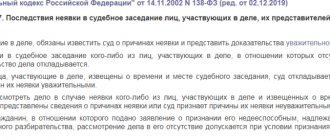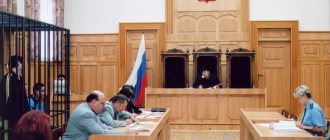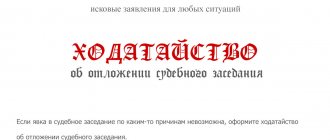1. If the trial is impossible due to the failure of any of the summoned persons to appear at the court hearing or due to the need to require new evidence, the court issues a ruling or order to postpone it for a certain period. At the same time, measures are being taken to summon or bring in persons who did not appear and to demand new evidence.
2. After the resumption of the trial, the court continues the hearing from the moment from which it was adjourned.
3. If the defendant has disappeared, except for the case specified in part four of this article, as well as in the case of his mental disorder or other serious illness that excludes the possibility of the defendant’s appearance, the court shall suspend proceedings against this defendant, respectively, until he is found or recovered and continues judicial proceedings. proceedings against the remaining defendants. If a separate trial prevents the consideration of a criminal case, then all proceedings on it are suspended. The court issues a ruling or order to search for the fugitive defendant.
4. If there are grounds specified in part five of Article 247 of this Code, at the request of the parties, the trial is conducted in the absence of the defendant. The court issues a ruling or resolution regarding the conduct of the trial in the absence of the defendant.
Article 253 of the Code of Criminal Procedure of the Russian Federation. Adjournment and suspension of trial (current version)
1. The requirement of the law to postpone the trial only for a certain period of time is aimed against judicial red tape and to ensure the urgency of judicial protection of the rights and legitimate interests of citizens. At the same time, this article refers to the court making a decision to postpone the trial only if the trial is impossible due to the failure of one of the summoned persons to appear at the court hearing or due to the need to require new evidence. However, in practice, there are often other cases when it is impossible to conduct a trial scheduled by a judge or court for a certain time, for example, due to the illness of the judge, his employment in another trial, etc. Usually in such circumstances, in practice, it is announced that the case is “withdrawn from consideration” and its hearing is postponed to another, sometimes indefinite, time without making any court decision. This unduly interferes with the urgency and regularity of the trial and, furthermore, precludes the parties from appealing to a higher court against an extra-procedural adjournment of the trial. It seems that in such cases the chairman of the court, by his written order, must transfer the case for consideration to another judge or another panel of the court.
2. The decision to postpone the trial for a certain period is made, in particular, in connection with the need to require new evidence, including for conducting a forensic examination. Some authors believe that this provision of Part 1 of the commented article opens up the actual opportunity for the court to refer the case for additional investigation. However, such an interpretation unnecessarily extends the content of this norm to relations that are not clearly provided for by it. Thus, it only talks about the court requesting new evidence, and not about the requirement for the preliminary investigation body to carry out additional investigative actions. You can only demand objects and documents (certificates, characteristics, copies of verdicts, etc.).
———————————
See: Piyuk A.V. On the issue of the role of the court in eliminating gaps in the preliminary investigation // Bulletin of the Tomsk State University. un-ta. Series “Economics. Legal sciences". Tomsk, 2003. P. 81.
3. The Qualification Commission of the Moscow Bar Chamber did not agree with the attempt of the applicant (judge) to distinguish between the interruption of the court session and the adjournment of the trial (Article 253 of the Code of Criminal Procedure of the Russian Federation), as not based on the law. Since the Code of Criminal Procedure does not contain such a general condition for judicial proceedings as continuity, then, in the opinion of the Qualification Commission, there is no legal difference between a break in the court hearing and the adjournment of the trial. The break as an independent criminal procedural institution is mentioned only in Part 3 of Art. 187, part 1 art. 425, part 2 art. 298 of the Code of Criminal Procedure of the Russian Federation, which do not regulate the course of the court hearing. The Qualifications Commission notes that the ethical rules of conduct for a lawyer must be the same, regardless of how a particular judge called the time period during which the criminal case will not be considered - a break or adjournment.
———————————
See: Review of the disciplinary practice of the council of the Moscow Bar Association, November 22, 2006. https://www.businesspravo.ru/Docum/DocumShow_DocumID_120179.html.
4. Trials in criminal cases of grave and especially grave crimes may be conducted without the consent of the defendant. See also commentary to Art. 247.
Comment source:
Ed. A.V. Smirnova “COMMENTARY ON THE CRIMINAL PROCEDURE CODE OF THE RUSSIAN FEDERATION” (ARTICLE BY ARTICLE), 5th edition
SMIRNOV A.V., KALINOVSKY K.B., 2009
Everything about criminal cases
Go to the text of the Code of Criminal Procedure
Url Additional information:
I). Adjournment of trial
- part 1 253 of the Code of Criminal Procedure
adjournment of the trial is carried out in the following cases:
- part 1 253 of the Code of Criminal Procedure
in case of non-appearance of summoned persons
- part 1 253 of the Code of Criminal Procedure
to request evidence
- part 1 253 of the Code of Criminal Procedure
for measures to bring those who did not appear, to demand evidence
- part 2 253 of the Code of Criminal Procedure
resumes from the moment from which it was postponed
II). Suspension of proceedings
- Part 3 253 Code of Criminal Procedure
suspension of the proceedings is carried out in the following cases:
- Part 3 253 Code of Criminal Procedure
if the defendant escaped
- Part 3 253 Code of Criminal Procedure
for mental disorder
- Part 3 253 Code of Criminal Procedure
in case of serious illness
- Part 3 253 Code of Criminal Procedure
proceedings are suspended in relation to one person
- Part 3 253 Code of Criminal Procedure
for the rest, the proceedings are ongoing
- Part 3 253 Code of Criminal Procedure
may be suspended for all defendants
- Part 3 253 Code of Criminal Procedure
a search is launched for the fugitive defendant
Continuation of the trial in the absence of the defendant
- Part 4 253 Code of Criminal Procedure
in the absence of the defendant, the trial may continue (
Part 5 247 of the Code of Criminal Procedure
)
Article 253 of the Code of Criminal Procedure. Adjournment and stay of trial
Url Additional information:
- P.18
Plenum No. 28, the trial against other accused continues
1) The court issues a ruling or order to postpone the trial for a certain period if it is impossible due to:
- failure of any of the summoned persons to appear at the court hearing,
- or due to the need to obtain new evidence.
At the same time, measures are being taken:
- by summoning or bringing in persons who do not appear,
— and the demand for new evidence.
2) After the resumption of the trial, the court continues the hearing from the moment from which it was adjourned.
Url Additional information:
— Part 3 389.2 Code of Criminal Procedure
this decision can be appealed before the final decision is made
3) Court:
- suspends proceedings against the defendant until he is found or recovered,
- and continues the trial against the remaining defendants if:
- the defendant fled, except for the case specified
in part 4 of this article,
Url Additional information:
— clause 9
Plenum No. 6 temporary mental disorder entails suspension of the case
- and also in the event of his mental disorder,
- or other serious illness that precludes the defendant from appearing.
If a separate trial prevents the consideration of a criminal case, then all proceedings on it are suspended.
The court issues a ruling or order to search for the fugitive defendant.
Url Additional information:
- Part 5 247 Code of Criminal Procedure
if he evades appearance, consideration in absence
4) If there are grounds specified in Part 5 247 of the Code of Criminal Procedure, at the request of the parties, the trial is conducted in the absence of the defendant. The court issues a ruling or resolution regarding the conduct of the trial in the absence of the defendant.
Return to the text of the Code of Criminal Procedure
Seek advice
Two rulings of the RF Supreme Court regarding the adjournment of a court hearing
I came across two rulings by the RF Armed Forces - No. 305-ES18-7308 dated 10/18/2018, No. 305-ES18-9677 dated 10/30/2018 (there is material about the latter on Pravo.ru).
Both definitions contain an identical legal position that the court of first instance had to take into account that written explanations were presented by the defendant directly at the court hearing, which means there were all grounds for its postponement, especially since the plaintiff filed a corresponding petition.
I don’t presume to say in general, but in practice it is quite normal for the defendant not to participate in the preliminary court hearing, but to hand over documents in the corridor or in the courtroom, including to the judge. And so does the plaintiff.
If we talk about Moscow, then there are two trends associated with the high workload on judges: some are ready to postpone the hearing on any formal grounds, while others strive to resolve the case on the merits in one go, moving from preliminary to main.
Both there and there problems arise.
In the first case, the defendant seems to be placed in a more advantageous position, since he can choose a model of behavior aimed at delaying the process (petitions, explanations, etc.). However, the plaintiff can also abuse this (for example, realizing that the case is lost, nevertheless, dragging it out in anticipation of some miracle).
In the second case, everything is even more complicated. Here the court can either satisfy or deny the claim, without taking into account the parties’ arguments about the need to provide explanations. Relatively speaking, when everything is clear to the judge at once.
These definitions speak of the general principle of adversarial behavior of the parties in the arbitration process. At the same time, the court did not say a word about the good faith of the parties, how they acted in the process, why the court considered that the plaintiff needed time to get acquainted.
Of course, appropriate conclusions can be drawn from the circumstances of a particular case. However, it seems to me that some general principle should be formulated, in this case related to the conduct of the defendant when his actions violate the adversarial principle.
It is known that the decision to postpone a court hearing in most cases depends on the mood or personality of the judge: someone is active in the process, someone prefers that the parties do everything themselves, right down to presenting the legal position on removable media.
Taking into account these definitions, does it mean that the parties, if, for example, they both benefit from long-term litigation, have the right under any circumstances to appeal to the adversarial principle and the need to provide additional time?
The positions of the parties in terms of the complexity of the case may be different, and the qualifications of lawyers (or non-lawyers at all) may also be different. The court did not draw any line between adversarialism and good faith of the participants in the process.
And if at the court hearing the plaintiff presents a 0.5-page review, consisting of quoting a rule of law (well, an accountant, an individual entrepreneur came, or even an individual), will the defendant be able to take advantage of the opportunity to postpone the hearing? It turns out that yes. Perhaps I am going too far, but again, taking into account the personality of the judge and the degree of eloquence of the defendant, this is quite possible. Especially, referring to the judicial acts adopted by the RF Armed Forces.
I think there are a huge number of similar situations. And it seems that these definitions are aimed at protecting the bona fide party, but no matter how they backfire.
Grounds for holding a preliminary hearing in criminal proceedings and the timing of its appointment
The norms of Part 2 of Art. 229 of the Code of Criminal Procedure of the Russian Federation defines the grounds for holding a preliminary hearing:
- petition of the parties to join criminal cases (cases are joined under Article 139.2 and 153 of the Criminal Procedure Code of the Russian Federation);
- the basis for separating a criminal case (a case is segregated under Article 139.1 of the Code);
- a sentence that has not entered into force if the person against whom a new criminal case has been filed has a suspended sentence for a crime he committed in the past;
- settlement of nuances in the consideration of a criminal case (CD) by a court with a jury;
- petition of the party to carry out proceedings in court under Part 5 of Art. 247;
- grounds for suspension or termination of the case (they are provided for in Articles 238 - 239);
- grounds for returning the case to the prosecutor (under Article 237 of the Code);
- a request of a party that excludes any evidence when it is stated under Part 3 of Art. 229.
At least one such ground must be present for a preliminary hearing to be held.
The deadline for scheduling a preliminary hearing in a criminal case is specified in Part 3 of Art. 227 Code of Criminal Procedure of the Russian Federation. According to this norm, it amounts to a maximum:
- 30 days from the date of receipt of the UD by the court - in the usual manner;
- 14 days from the date of such receipt - in cases where the accused are kept in custody.
According to Part 4 of Art. 227 of the Code of Criminal Procedure of the Russian Federation, copies of the judge’s decision that sets the hearing are sent to:
- to the prosecutor;
- to the victim;
- to the accused.





